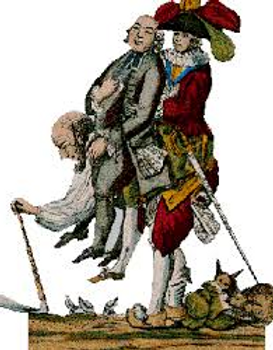
The Social Classes
Before the French Revolution
Before the French revolution, the social classes in France was composed of three different ranks. This classification doesn’t include the royalty because the royalty wasn’t considered inside the social class system ; it was a different level compare to the population.
The first rank was the clergy.
At this time, the Christian religion and god had a very important place in the life of the French people. The clergy represented the most important person in the kingdom just below the royal family. But they were represented only 5% of the population at this time.
The second rank was the nobles.
The nobles were the people who get a title from the king. Most of them were very rich because of taxes they ask to the peasants and merchants but, at this time, being nobles not necessary means being rich. Some of them were very poor and just had their title for them. The nobles who were in this situation, most of time, choose to marry their daughters with the sons of rich merchants called as bourgeois. The nobles represented only 1,5% of the population.
The third and last rank was the third estate.
The third estate represented all the population except the clergy and the nobles. The majority of this class was extremely poor because of all the taxes ask by the royalty, nobles and clergy. Only some the bourgeois were rich even after tax but approaching the French revolution, the tax higher and they started the revolution before became totally poor. The third estate represented 93,5% of the population.
The big majority of the population at this time get only 50% of the land to live because the rest was the property of the clergy and the nobles (respectively 10% and 40% of the land). It’s means that peoples should live in small area and share the space cause they didn’t have enough space for everyone.
All the privileges and the richness’s of the country was reserved for 6,5% of the population, the elite, who didn’t care about the problems and the poverty of the rest of the population.
It’s in this content of living that the revolution grew and start in 1789.
